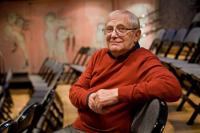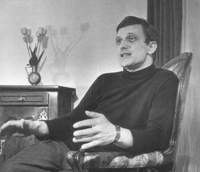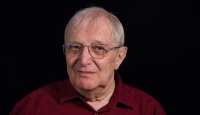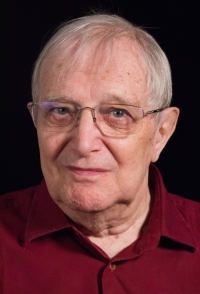Humor is my nature

Download image
Jiří Suchý was born on October 1, 1931 in Pilsen. In 1955, he was at the birth of the Reduta Theater. Its jazz and rock’n’roll disrupted the authorities’ ideas about socialist art from the very beginning. In 1958 he co-founded the Na Zábradlí Theater, and a year later he created the Semafor Theater with Jiří Šlitr, which has made a significant contribution to the history of Czech theater and popular music. While the relaxed 1960s were among the most successful in his career, the 1970s became a period of difficult zigzagging. Due to the signing of the manifesto Two Thousand Words in 1968, he was restricted in his artistic activities in the 1970s. He was not allowed to appear on television, on the radio, he could not make films, he was not allowed to publish books, he was deprived of his leading position at the Semafor theater. The activities of Semafor were influenced by the interest of the State Security, which monitored Jiří Suchý and many other employees and invited them to regular interrogations. In 1977, Jiří Suchý refused to sign the so-called Anti-charter. In 1989, on the other hand, he signed a petition for the release of Václav Havel from prison and the manifesto Several Sentences. In November 1989, the Semafor Theater, like other Czech theaters, went on strike and held discussions with the audience instead of performing. In November and December 1989, at the same time, Jiří Suchý and Jitka Molavcová toured the striking universities to support them. After the regime change in 1989, he returned to the leadership of the Semafor theatre. As early as in 1988, Jiří Suchý was convinced that the communist regime would collapse soon. In spite of that, he was indeed surprised by the course of the events. Together with other Czech theatres, his theatre Semafor joined the strike following the brutal police intervention against the student demonstration on 17th November, and instead of the performance, they held a discussion with the audience on that evening. In December his ensemble was then supporting the students´ strikes by visiting the individual faculties and talking with the students. The end of the totalitarian regime made it possible for Jiří Suchý to devote himself to independent pursuit of his artistic activities. He became the manager of the Semafor theatre again, and he introduced the play “Heigh-ho, or There will be no Hell, and the Paradise is Coming Back,” which was a reaction to the social changes of the time. In order to summarize the twenty-year era of freedom, Jiří Suchý borrowed the words from one of his plays. “Now we have arrived to an early stage of capitalism, and capitalism is much better than socialism, but it is worse than I had expected.”



